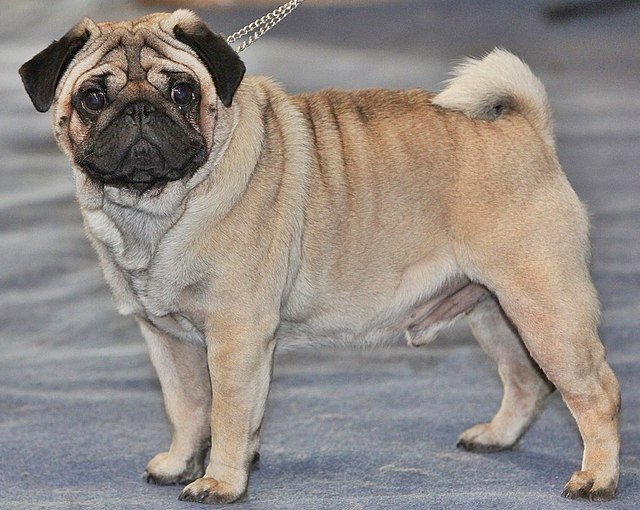Pug vs Golden Retriever (A Comprehensive Breeds Comparison)
Pug vs Golden Retriever (Complete Breeds Comparison)
Pugs and Golden Retrievers are two of the friendliest dog breeds that will put a smile on your face. They each offer a unique but equally fulfilling companionship, with unique traits and rich histories. And I am not surprised that you are confused between Pugs vs Golden Retrievers. So, I will explain some of the differences between the two so you can make an informed decision.
Pugs are a small yet sturdy breed, renowned for their delightful and affectionate nature. They originate from China and are highly regarded by royalty. They are playful, sociable, and thrive on companionship. This makes them an excellent choice for those desiring a laid-back indoor companion.
Golden Retrievers are lively Scottish gundogs, celebrated for their friendly, reliable, and eager-to-please personalities. Golden Retrievers are often well-suited for active households because of their intelligence and joy in life. In this article, we will explore the distinctive characteristics of these two breeds, helping prospective pet owners make informed decisions.

|
|
|
|
|
|
|
|
|
|
|
|
|
|
|
|
|
|
|
|
|
|
|
|
|
|
|
|
|
|
|
|
|
|
|
|
|
|
|
|
Breed Origins and Popularity
Origins of the Pug and Golden Retriever
Pugs originated in China, where they were bred as cherished companions for the rich as far back as 400 B.C. The breed's popularity extended across Asia and Europe, finding favor in royal palaces and upper-class households.
Golden Retrievers have a more recent origin, emerging in nineteenth-century Scotland through Sir Dudley Marjoribanks, later known as Baron Tweedmouth. They crossed Flat-coated Retrievers with Water Spaniels and added Red Setter, Labrador Retriever, and Bloodhound genes. The Kennel Club officially recognized the breed in 1913.
Current Popularity of Both Breeds
Recent data from the American Kennel Club (AKC) positions Pugs as the 28th most popular among the 204 AKC-recognized breeds. Pugs have witnessed a notable surge in popularity, experiencing a five-fold increase in Kennel Club registrations from 2005 to 2017.
Golden Retrievers consistently maintain high popularity, currently holding the 3rd position among all dog breeds according to the AKC. Their known attributes of friendliness, loyalty, and intelligence contribute to their widespread appeal, particularly among families.
Physical Characteristics
Size Comparison
Golden Retrievers fall into the large breed category, with males typically weighing between 65-75 pounds and females between 55-65 pounds. They stand at a shoulder height of about 21-24 inches. Pugs belong to the small breed category, with an average weight ranging from 13-20 pounds and a standing height of 10-14 inches.
Coat Type and Grooming Needs
Golden Retrievers have a dense, water-repellent double coat, varying in texture from wavy to straight. They exhibit substantial feathering on their chest, legs, and tail, shedding frequently, and requiring regular brushing for maintenance. Pugs feature a short, smooth, and glossy coat in colors like fawn, apricot fawn, silver fawn, or black. Although their coat is not as dense as that of Golden Retrievers, Pugs have elevated grooming needs due to their unique facial wrinkles, demanding regular cleaning to prevent infections.
Unique Physical Features
Golden Retrievers are characterized by a broad head, friendly and intelligent eyes, short ears, straight muzzle, and a feathery tail carried with a "merry action." Pugs possess distinctive physical traits, including a wrinkled, short-muzzled face and a curled tail. Their large, rounded, and dark eyes contribute to their charming appearance. Notably, Pugs exhibit two distinct ear shapes, "rose" and "button," with "rose" ears being smaller than the standard "button" ears.
Personality and Temperament
Pug Personality and Temperament
Pugs have a steady and affable temperament, exuding great charm and a warm, outgoing nature. Bred primarily as companions, they are cherished for their affectionate demeanor. Intelligent and playful, Pugs possess a touch of mischief, especially when left alone for extended periods.
While not as lively as some breeds, they display a dry sense of humor and a more serious side. Pugs can be a tad stubborn but are eager to please, responding well to patient and dedicated training. These stubborn dogs make excellent companions, easily getting along with other dogs and children, and thriving in homes filled with love and attention.

Golden Retriever Personality and Temperament
Golden Retrievers are friendly, trustworthy, and eager to please, making them ideal family pets. They show compatibility with other pets and strangers, being playful yet gentle. They are intelligent and devoted, making them excellent family pets. Their friendliness shines through as they enjoy tasks like retrieving the newspaper or assisting with waking up the kids. Generally, they are not good watchdogs because they do not bark excessively and lack guard instincts.
Comparison of Social Needs
Both Pugs and Golden Retrievers exhibit social tendencies, though with distinct nuances. Pugs seek their owner's attention, thriving on the joy of pleasing them. Despite their small stature, they are suitable for families with children due to their playful and affectionate nature. While not as vivacious as some toy breeds, Pugs bring a touch of seriousness with their dry sense of humor.
Golden Retrievers revel in social interactions, thriving in lively environments and displaying playfulness while maintaining gentleness with children and harmony with other pets and strangers. Both breeds enjoy pleasing their owners, but Golden Retrievers tend to be more active and outgoing, while Pugs are content with a more laid-back lifestyle.
Trainability and Intelligence

Golden Retrievers are widely regarded as one of the brightest dog breeds, boasting intelligence, adaptability, and a strong desire to please. This makes them relatively easy to train, excelling in tasks ranging from guide and therapy roles to search-and-rescue duties. Despite their quick learning abilities, even well-trained Golden Retrievers may engage in occasional mischievous behavior, requiring owners to be prepared for playful antics.
Pugs are generally considered to possess average intelligence compared to other breeds. Their reputation for being stubborn and independent can pose challenges during training. However, Pugs are motivated by a deep desire to please their owners, making them trainable with patience and positive reinforcement. It's crucial to avoid harsh training methods, as Pugs are sensitive and their feelings can be easily hurt. Their high motivation for treats can be leveraged in training. Despite their average intelligence, Pugs exhibit a remarkable level of emotional intelligence, being attuned to their owners' emotions.
Health Concerns
Pugs and Golden Retrievers, like all dog breeds, come with specific health concerns and expected lifespans.
Pugs:
Pugs, owing to their brachycephalic (short-nosed) structure, are prone to several health issues:
- Brachycephalic Obstructive Airway Syndrome (BOAS): Caused by their shortened skull, this can lead to breathing difficulties.
- Eye Problems: Large eyes make Pugs susceptible to injuries and infections.
- Skin Disorders: Allergies can result in itchy skin and skinfold infections.
- Dental Disease: Pugs are prone to periodontal disease.
- Legg-Calvé-Perthe Disease: Affects the hip joint in small breeds like Pugs. The average lifespan of a Pug is typically between 12-15 years.
Golden Retrievers:
While generally healthy, Golden Retrievers can face specific health issues:
- Hip and Elbow Dysplasia: A skeletal condition leading to arthritis or lameness.
- Heart Problems: Conditions like aortic stenosis can occur.
- Skin Conditions: Their dense fur may harbor bacteria, and they are prone to allergic reactions.
- Cancer: Various forms, including hemangiosarcoma and lymphosarcoma.
- Hypothyroidism: Symptoms include lethargy, weight gain, thinning hair, and exercise intolerance. The average lifespan of a Golden Retriever is typically between 10-12 years.
Note: These health concerns are potential issues and not every Pug or Golden Retriever will experience them. Regular veterinary check-ups and a healthy lifestyle play crucial roles in managing these conditions, ensuring a long and healthy life for these beloved breeds.

Suitability for Families and New Owners
Pugs:
Pugs are characterized by their intelligence, affectionate demeanor, and unwavering loyalty to their owners. Their adaptability makes them well-suited for various living environments, whether in apartments or houses, urban or rural settings. They seamlessly integrate into different family dynamics, proving to be a safe choice for families with children of all ages.
With their playful and energetic nature, Pugs make excellent family pets, particularly for those residing in apartments, as they don't demand extensive exercise. However, their love for food requires careful management to prevent obesity. Despite their short coats, Pugs shed quite a bit and necessitate regular grooming.
Potential owners should be aware of specific health concerns linked to their brachycephalic nature. The cost of acquiring a Pug from a reputable breeder typically ranges from $1,000 to $6,000.
Golden Retrievers
Golden Retrievers are celebrated for their intelligence, adaptability, and gentle temperament. While generally good with children, successful integration into family life requires a commitment of time and energy from parents.
As a sporting breed, Golden Retrievers need regular exercise and ample space, emphasizing the importance of a fenced-in yard. Training and socialization from a young age are essential for a smooth transition into family dynamics.
Regular grooming is necessary due to their shedding tendencies. When obtained from a breeder, Golden Retrievers should undergo screening for various health conditions, including heart diseases, eye issues, and hip dysplasia. The cost of acquiring a Golden Retriever varies but is generally reflective of the breed's popularity and can range from moderate to high.
Conclusion
Pugs and Golden Retrievers share popularity due to their friendly and loyal nature, yet they differ significantly in size, activity level, grooming needs, health concerns, and trainability. Golden Retrievers, being larger and more active, demand increased grooming efforts. Their intelligence and trainability make them suitable for active individuals or families who enjoy outdoor activities, although they are prone to health issues such as hip dysplasia and heart problems.
Pugs are smaller, less active, and require less grooming. Their affectionate nature and adaptability make them fitting for apartment dwellers or those with limited space, but their brachycephalic nature predisposes them to respiratory problems.
The choice between a Pug and a Golden Retriever hinges on your lifestyle, living circumstances, and personal preferences. Both breeds have unique traits and considerations, emphasizing the importance of aligning your decision with your long-term commitment to provide the best life for your future furry companion.







